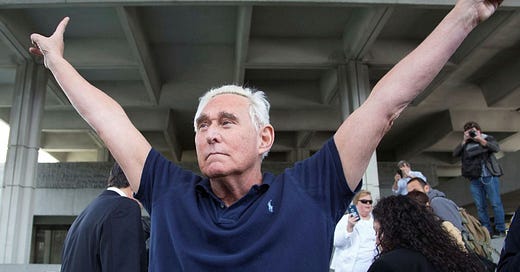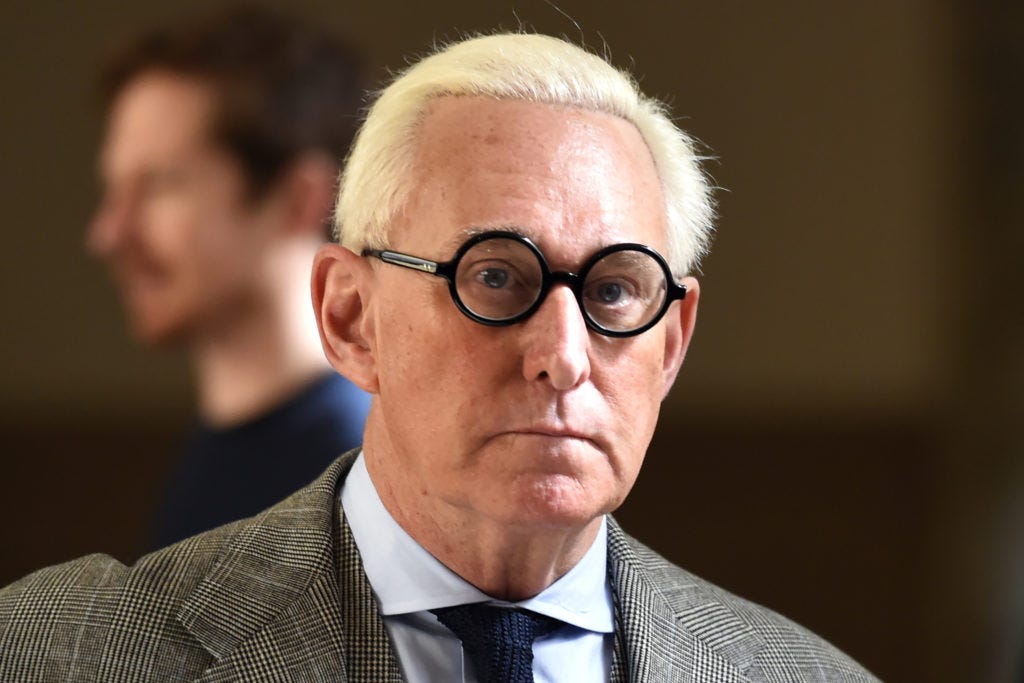Roger Stone Gets His Reward
Last Friday, a few days before Roger Stone was due to report to prison, president Trump commuted his sentence. Stone remains a convicted felon (for now) but will not have to serve his forty-month prison term. Trump’s move was not a surprise; he’s hinted at pardoning Stone for months and it always seemed unlikely he would allow his friend and confidant to actually serve time. But although expected, Trump’s action to reward Stone for his criminal cover-up on Trump’s behalf is still profoundly corrupt. The only consolation is that Trump was forced to act before the November election so voters can respond accordingly.
Background on Stone’s Conviction
In 2016 Russian hackers stole tens of thousands of emails and documents from the Hillary Clinton campaign and Democratic party sources. In the months leading up to the presidential election, they gradually released those documents via Wikileaks, in an effort to boost the Trump campaign and harm Clinton. Special Counsel Robert Mueller’s team ultimately indicted twelve Russian intelligence officials for taking part in that hacking. Although they documented multiple contacts between Russians and the Trump campaign, Mueller’s investigators did not conclude that anyone in the campaign had actively conspired – or “colluded” – with the Russians concerning the hacking and release of the emails. Mueller did conclude that the Russians perceived they would benefit from a Trump victory and worked to make that happen, and that the Trump campaign perceived that it would benefit from Russia’s actions.
Stone is a long-time Republican operative and advisor to Trump and his campaign. During the fall of 2016, he acted as an intermediary between the Trump campaign and Wikileaks, gathering information about what stolen documents might be released and when. He made repeated public statements claiming inside knowledge of what Wikileaks was doing and claiming to be in touch with Wikileaks founder Julian Assange. The Mueller report documented multiple contacts between Stone and the campaign concerning the Wikileaks releases, as well as Trump’s own knowledge and encouragement of Stone’s efforts.
In 2017, Stone was called to testify before a Congressional committee investigating Russia’s interference in the election and possible connections to the Trump campaign. During his Congressional testimony he repeatedly lied about his role as an intermediary between the campaign and Wikileaks and his contacts with others in the campaign. Over a period of several months he also repeatedly threatened another witness, Randy Credico, trying to persuade him not to testify or to lie to investigators.
Mueller’s prosecutors ultimately indicted Stone for seven felony counts of obstruction of justice, lying to Congress, and witness tampering. A jury in the District of Columbia found him guilty of all charges in November of 2019. The sentencing guidelines in his case called for sentence of about 7 to 9 years. But after prosecutors had filed papers arguing for a guidelines sentence, Attorney General Barr, in an extraordinary personal intervention, ordered the U.S. attorney to disavow that position and seek a more lenient sentence – resulting in all of the career prosecutors withdrawing from the case. Judge Amy Berman Jackson ultimately sentenced Stone to forty months in prison, noting during the sentencing hearing that Stone had been “prosecuted for covering up for the president.”
Stone sought to postpone serving his sentence, citing concerns about his age and Covid-19. Judge Jackson denied his request to delay his report date until September, noting that there were no Covid outbreaks in Stone's designated prison. Stone was due to report to prison today, Tuesday, July 14. But late last Friday evening, president Trump announced he was commuting Stone’s sentence.
The White House Statement on Clemency
The official White House statement on this grant of “executive clemency” is, quite frankly, an embarrassment. It reads like a Trump Tweet. It alleges that, “Roger Stone is a victim of the Russia Hoax that the Left and its allies in the media perpetuated for years in an attempt to undermine the Trump Presidency.” It claims that frustrated prosecutors, unable to prove collusion, resorted to “process based charges” borne of “frustration and malice” and a desire for “splashy headlines.” It further claims that, “The simple fact is that if the Special Counsel had not been pursuing an absolutely baseless investigation, Mr. Stone would not be facing time in prison.” And it concludes with one of Trump’s trademark exclamation points: “Roger Stone is now a free man!” (Interestingly enough, though, the statement never denies that Stone committed the crimes for which he was convicted.)
Where to begin? The “Russia Hoax,” of course, was never a hoax. It was a serious investigation into Russian interference in the election and the possible involvement of those in the Trump campaign. Mueller indicted about two dozen Russians for that interference, and documented scores of contacts between Russian individuals and those associated with the Trump campaign.
This should go without saying, but the fact that no campaign officials were charged with conspiring with Russia does not render the investigation itself a hoax. Often the purpose of such a white collar investigation is to determine whether a crime has been committed, when that may be unclear at the outset. There was a more than sufficient reason to investigate, as recognized not only by the Department of Justice but also by both parties on Capitol Hill, who conducted their own probes.
What's more, as Mueller noted, the fact that witnesses including Stone and the president himself lied to investigators or refused to cooperate impeded the ability to find the whole truth about the Trump campaign’s contacts with Russia. Even if those contacts were not ultimately criminal, Stone's obstruction kept investigators and the public from learning the full details and the extent to which the Trump campaign encouraged foreign interference in the election. Truthful testimony from Stone also may have indicated that Trump himself lied in his written answers to Mueller, when he denied any recollection of Stone's involvement with the Wikileaks document dumps. Stone's stonewalling kept all that information concealed and protected the president.
By the way, speaking of Congressional investigations, contrary to the White House statement’s implications, Stone was not convicted of lying to Mueller’s investigators. He was convicted of lying to a Congressional committee -- one that, at the time, was led by Republicans. You might think some of those Republican members of Congress would be concerned about the president granting clemency to a defendant convicted of lying to them and obstructing their investigation. But so far – crickets.
The idea that Mueller was seeking “splashy headlines” is also pretty comical. Mueller was notoriously tight-lipped during the investigation, refusing to speak out even after the investigation was concluded and Attorney General Barr had distorted his findings. In fact, he only now broke his silence in the wake of the Stone commutation, writing an extraordinary op-ed in the Washington Post defending the prosecution and his team from the attacks by the White House. Mueller never sought headlines during his investigation, but Trump’s actions concerning Stone were finally enough to push him over the line.
Better Ask Barr
The White House might have checked with Trump’s own Attorney General before releasing the statement trashing the Stone prosecution. Attorney General William Barr has shown himself willing to go very far to protect Trump and the presidency, resulting in multiple calls for his own resignation and impeachment. And he did personally intervene in the Stone case, undermining his own career prosecutors to call for a sentence below that recommended by the sentencing guidelines.
But apparently commuting Stone’s sentence was too much even for Barr. He recently said that he thought Stone’s prosecution was “righteous” and that his (reduced) sentence was appropriate. According to news reports, he counseled Trump against commuting Stone’s sentence. It's hard to know whether such reports are credible or whether Barr is just trying to save face. But regardless, I won’t be holding my breath waiting for Barr to resign in protest.
Stone Gets His Reward
Throughout Mueller’s investigation and his own trial, Stone repeatedly and proudly proclaimed that he would never testify against the president. Trump regularly praised Stone for keeping his mouth shut, with Tweets like this:
Just last week, as if to remind the president that he’s been a stand-up guy, Stone said in an interview with journalist Howard Fineman: “He [Trump] knows I was under enormous pressure to turn on him. It would have eased my situation considerably. But I didn’t. They wanted me to play Judas. I refused.” And now, with the grant of clemency, Stone has been rewarded for his loyalty.
To see how Trump operates, all you have to do is look at how different witnesses from his inner circle were treated. Cohen and former campaign manager Paul Manafort, who ultimately cooperated with investigators, have gone to jail and received no clemency. Cohen was publicly derided by Trump as a “rat.” But Stone, who stood fast and took the rap, found favor with the boss and will never see the inside of a jail cell. The whole thing sounds like the script from a mob movie.
The Potential Crimes in the Commutation
Other presidents have issued controversial pardons and commutations. But Trump’s clemency for Stone is unique in that it so clearly appears to be part of a personal quid pro quo, a reward for Stone’s refusal to cooperate in a case potentially implicating the president himself. This makes Trump’s clemency for Stone not merely unseemly, but potentially criminal itself. Indeed, Barr himself acknowledged during his confirmation hearing that it would be a crime for a president to pardon a witness in exchange for a promise not to testify against him.
As I wrote in this post, one potential crime is bribery. A president who grants clemency in exchange for a witness refusing to cooperate against the president could be guilty of bribery of a witness, in violation of 18 U.S.C. 201(b)(3). The president is providing a thing of value – the grant of clemency – to Stone in exchange for Stone’s agreement not to testify against him. It doesn’t matter that the actual refusal to testify took place some time ago. The crime is the corrupt deal; the president is now simply consummating that earlier, understood agreement.
Another possibility is that Trump and Stone’s actions could be seen as steps in a conspiracy to obstruct justice. It’s the culmination of an ongoing corrupt endeavor to prevent the Mueller investigation and various Congressional committees from learning the truth. Although those investigations are largely concluded, the commutation could be considered an overt act in furtherance of an ongoing conspiracy, lasting several years, to obstruct those investigations.
If Trump loses in the fall, a new Department of Justice could potentially investigate such charges. It’s unclear whether there will be any appetite to do so. The country may just be ready to move on. And of course, Trump may grant a flurry of new pardons after the election – including potentially trying to pardon himself – that could complicate any such efforts.
The Silver Lining - Sort Of
It was inevitable that Trump would spare Stone from prison. If there is a silver lining, it’s that he was forced to do so prior to the election. Trump has been pretty successful at stonewalling and running out the clock on a number of potentially damaging controversies. Although the Supreme Court decided in a pair of cases last week that he does not have absolute immunity from turning over his tax returns to investigators, it looks like he will be able to tie those subpoenas up with further litigation until after the election. Various White House officials, such as former White House counsel Don McGahn, have refused to testify before Congress and those claims are still tied up in court. Lawsuits pending for several years about Trump enriching himself in violation of the Emoluments Clause have yet to produce any significant public information. And although it seems extremely likely that Trump will ultimately pardon his former national security advisor Michael Flynn, that case too continues to slog through the courts and Trump may be able to avoid acting until after the election.
But when it came to Stone, Trump ran out of time. He may still decide to grant Stone a full pardon once the election is over. But for now, he either had to act or let Stone go to prison. Many details about Trump administration corruption and Trump’s personal finances remain hidden, but at least this latest episode of corruption is out there for the voters to see. Trump has to own this one. And in a long litany of corrupt acts and perversions of the justice system by this administration, rewarding Stone for his refusal to “rat out” the president deserves a place near the top of the list.
Update: Trump did pardon Stone on December 23, 2020, after losing the election.








